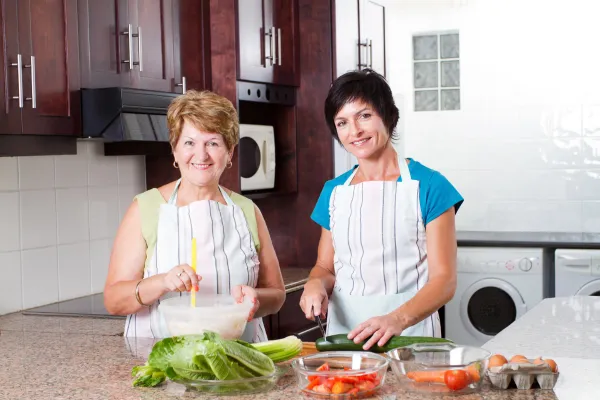
Never Learned to Cook? Start Here (No Shame, Just Real Skills)
Feel like you're starting from scratch in the kitchen? You're not alone.
Most women over 50 were never really taught how to cook. We were busy raising families, working full-time, and trying to keep things running—so meals had to be fast, not fancy.
Now that you're ready to focus on your health, you're realizing that cooking matters—but you don’t know where to start.
This blog gives you the foundational skills to begin—without judgment, stress, or perfection.
Step 1: Set Up Your Kitchen So It Works for You
A cluttered, disorganized kitchen makes cooking feel chaotic.
Start by creating simple “zones”:
Prep Zone: Cutting board, sharp knife, mixing bowls
Cooking Zone: Pots, pans, cooking utensils
Pantry Zone: Easy-to-grab staples
Fridge/Freezer Zone: Store your most-used ingredients at eye level
💡 Take 10 minutes today to clean off one countertop or reorganize one drawer. Small wins matter.
Step 2: Get the Right Tools (You Don’t Need a Lot)
You don’t need a Pinterest-perfect kitchen—you just need a few quality tools.
Start with:
A sharp chef’s knife
A cutting board that doesn’t slip
A skillet you actually like using
A sheet pan for roasting
A few mixing bowls
If you only upgrade one thing? Make it your knife. It changes everything.
Step 3: Start With Skills, Not Recipes
Instead of trying to follow complicated recipes, focus on learning basic techniques that you’ll use again and again.
Practice things like:
Sautéing onions and garlic
Roasting vegetables
Cooking chicken on the stovetop or in the oven
Making a simple salad dressing
When you know a few core techniques, you can mix and match ingredients without overthinking it.
Step 4: Use Simple Ingredients You Already Know
Healthy eating doesn’t have to be complicated or expensive.
Here are some easy, real food staples to keep on hand:
Eggs, Greek yogurt, chicken, lentils
Frozen veggies, salad greens, cherry tomatoes
Brown rice, quinoa, sweet potatoes
Olive oil, salt, pepper, garlic powder, and a few favorite spices
Pick one meal—like breakfast or lunch—and start practicing there.
Step 5: Learn as You Go (There’s No Deadline)
You don’t need to become a “good cook” overnight.
Try one new thing a week:
Roast one veggie
Make your first salad dressing
Cook a protein you’ve never made before
Practice your knife skills
Confidence comes from repetition—not perfection.
Want a Head Start?
Download the Beginner’s Cooking Toolkit—it’s your shortcut to getting comfortable in the kitchen.
You’ll get:
Step-by-step skill guides
Tool and ingredient checklists
Easy cooking tips you’ll actually use
